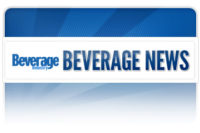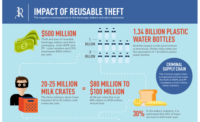DSD Strategies Highlights Changes, Opportunities In Distribution
DSD Strategies Highlights Changes, Opportunities In
Distribution
Beverage Industry and sister publication Snack Food and Wholesale Bakery recently held the first DSD Strategies: Direct Store Delivery Distribution & Marketing Conference at the Renaissance Resort at Seaworld in Orlando, Fla.
“Direct store delivery is not just a method of
delivery, but a unique way of doing business,” conference moderator
Stanley Makadok, president of Century Management Consultants, told
attendees at the start of the day-and-a-half-long event. But that way of
doing business has been challenged of late, requiring DSD operators to
“take the initiative rather than react,”
to changes in the industry, he said.
Hal Kravitz, vice president of business development
and chief revenue officer at Coca-Cola Enterprises, based in Atlanta,
provided the conference’s keynote address with a look at CCE’s
recent operating framework transformation. The address “Playing to
Win,” took attendees through CCE’s changes in determining which
products to carry, collaboration with retail customers and using technology
to better advantage.
Kravitz illustrated the
way CCE’s efforts have come together by highlighting the
company’s energy drink portfolio, which now gives the company a
product for each consumer segment.
Kevin Krigline, vice president of supply chain
optimization at Sara Lee Corp.’s food and beverage division,
discussed his company’s entry into DSD five years ago, with the
acquisition of the Earthgrains business, and other experiences in DSD in
“Similarities and Differences in Bakery and Soft Drink DSD
Operations.”
The bakery business, he said, requires a high level of
service, with daily or even more frequent merchandising efforts and a high
rate of returned product. Beverage distribution, on the other hand, offers
a shorter order lead time and longer shelf time. Both systems are dealing
with SKUs proliferation and the challenge of mining vast amounts of data
for usable information, he said.
Dave Hampton, director of customer delivery systems at
Frito-Lay Inc., offered “seven certainties of the future,” of
DSD in his “Ensuring DSD Thrives Through an Ever-Changing Retail
Landscape” presentation. Retail, technology and infrastructure
pressures will continue to force DSD to evolve, he said. But in the long
run, service is what will sustain DSD’s competitive advantage.
Richard Korchersperger, associate professor of the
food marketing department at St. Joseph’s University’s Haub
School of Business, presented DSD issues from the retailer side in
“Speaking out of Both Sides of Our Mouth: A Food Retailer’s
Perspective on DSD.” Claiming that consumers change behavior faster
than the system can change, Korchersperger described what he believes are
myths and realities in DSD, and likened the effort to protect today’s
DSD model, rather than anticipating and adapting to retail pressures, to
putting “a finger in the dam.”
Mike Wareheime, chairman of Snyder’s of Hanover,
and Fed Katz, practitioner faculty member of the marketing department at
Johns Hopkins University’s Graduate School of Business, compared the
relationship between retailers and DSD operators to a marriage in
“Getting Gold from your Distributors.” They outlined 10 common
sticking points in the retailer/distributor partnership and ideas for
making the relationship better for both parties.
“The Fifth P,” or People, was the topic of
a presentation by Gary Hallett, vice president of sales and marketing at
Southeast Atlantic Beverage Corp. Hallett discussed the personnel issues
unique to DSD and their impact on products and distribution. He outlined
some of the steps Southeast Atlantic has taken in the areas of employee
retention and job satisfaction, and the ways in which they have changed the
company’s business.
“The Perfect Store Visit,” a panel
discussion moderated by Eleven Technology Chief Executive Officer Tim
Curran, and featuring Martin Lavoie, project leader at Canada Bread Co.,
and Brendan O’Malley, director of enterprise applications at Tasty
Baking Co., looked at ways the two baking companies used technology to
solve distribution challenges. Both companies reported case studies in
which they implemented mobile technology to improve retail execution.
James Daniels, vice president of retail shelf
merchandising, national retail sales at Anheuser-Busch, kicked off the
second day’s activities with a look at “Retail Shelf
Merchandising in a DSD Environment.” Daniels highlighted the
advantages A-B sees in the three-tier distribution system, saying it is the
best system for brewers, wholesalers, retailers and especially consumers.
Beer’s shorter shelf life and environmentally controlled storage
requirements make it particularly well-suited to DSD, and out-of-stock
concerns require the frequent attention provided by DSD personnel.
Christine Brown, director of vendors at the Royal
Buying Group, discussed “The Changing Landscape of Convenience Store
Retailers — What They Look for in DSD Suppliers.” Energy
drinks, sports drinks and ready-to-drink coffee are leading beverage growth
at the c-store level, she said, but retailers
are wary of taking on new products, and manufacturers should have both an
entrance and exit strategy.
As a company that works with both cola distribution
systems as well as its own brands, Cadbury Schweppes Americas Beverages has
a unique perspective on category management, said the company’s Vice
President of Category Management Craig Hodnett in his presentation
“Best Practices in Efficient Assortment and Space Management.”
With vast experience in not only its own brands, but competitive brands as
well, Cadbury has developed strategies that help retailers maximize sales
in the entire beverage aisle. He says grouping products by beverage
occasion rather than functional attributes yields the greatest consumer
satisfaction and shopper loyalty.
Wayne Densch Vice President of Marketing David
Spindler rounded out the event with a presentation titled “Local Beer
DSD Issues.” He covered the realities of delivering beer at the
street level and discussed some of the ways his company has tackled distribution challenges. DSD Strategies was sponsored
by Ross Computer Systems, Safety Vision, BelTek, Chep Equipment Pooling
Systems and Eleven Technologies. BI
Looking for a reprint of this article?
From high-res PDFs to custom plaques, order your copy today!





